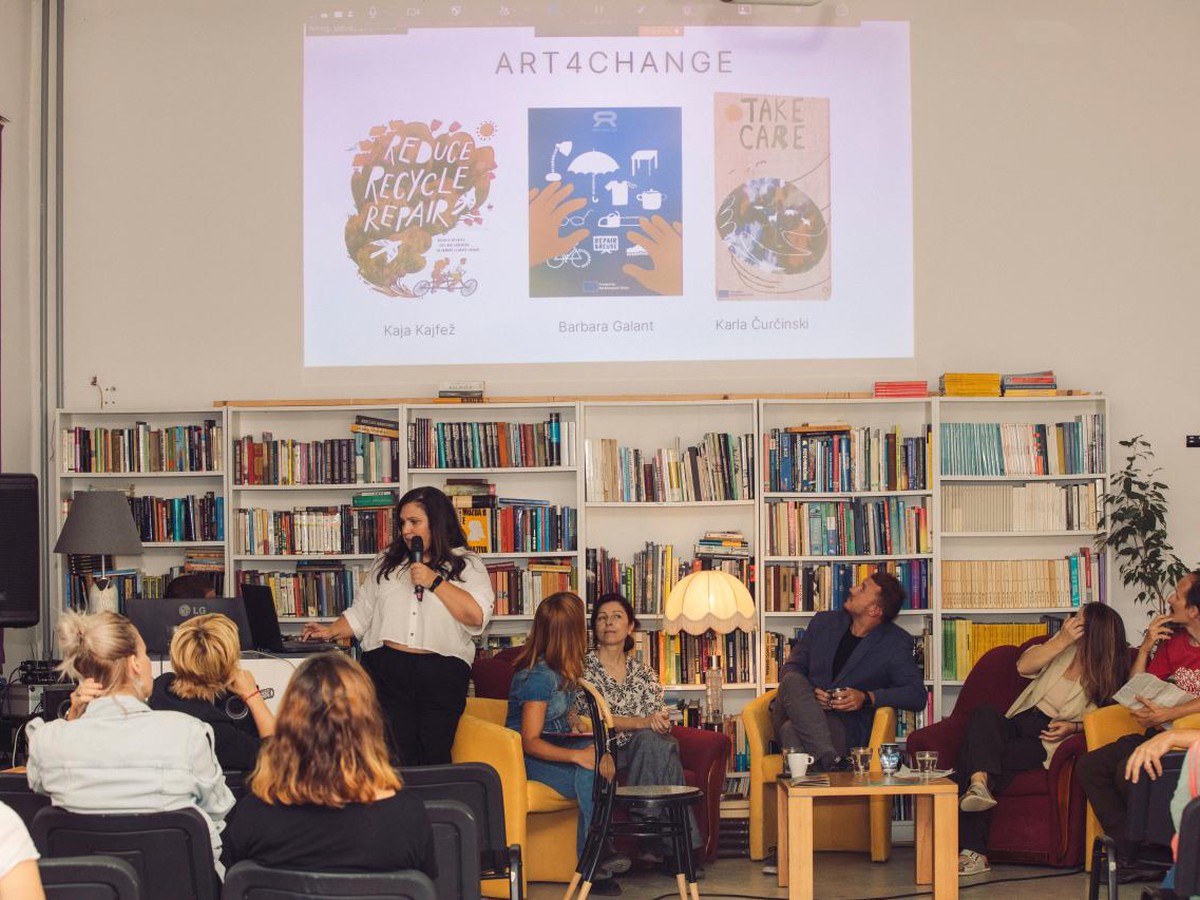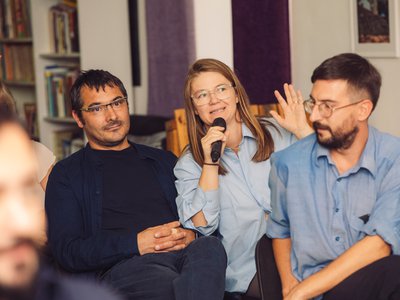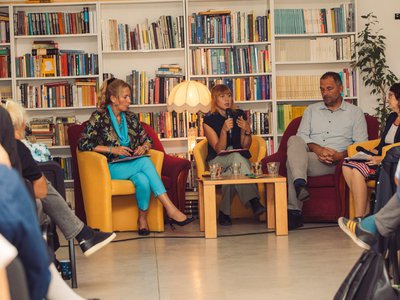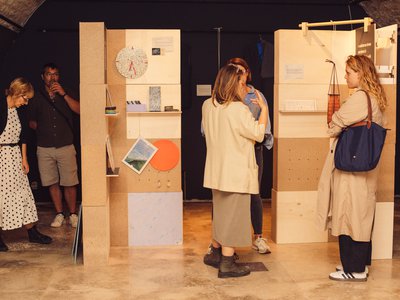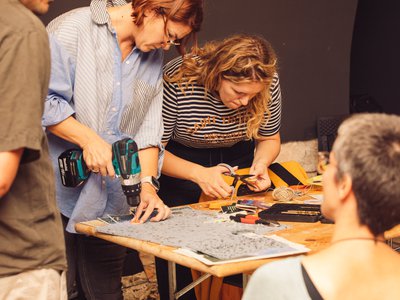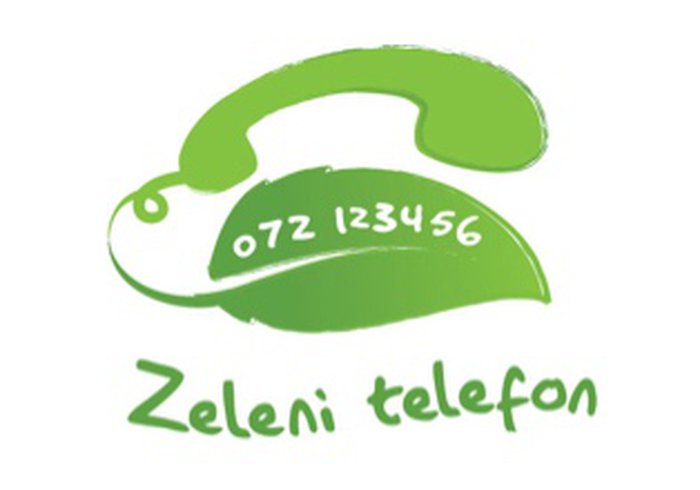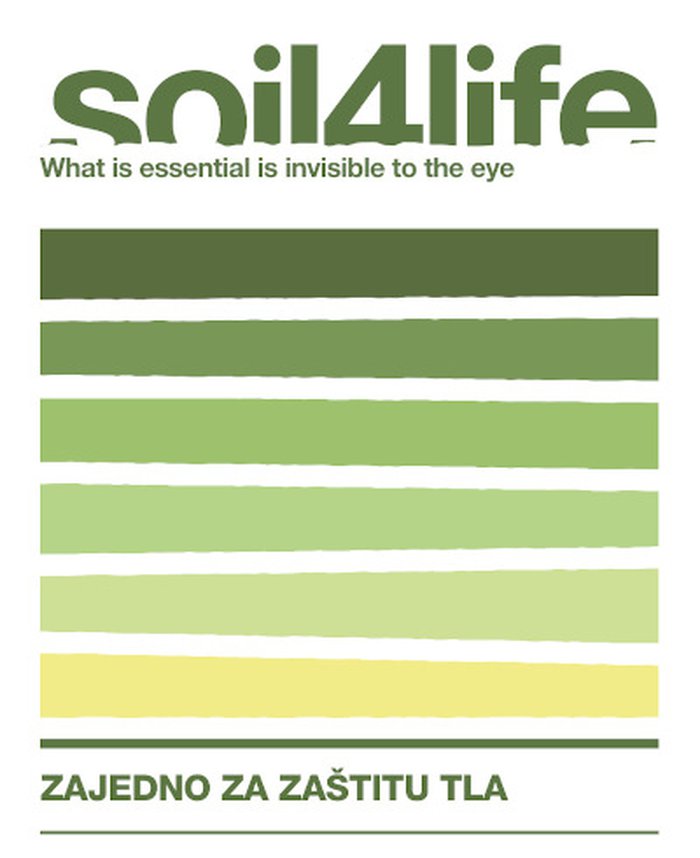Last week, the international conference "Communities Go Circular" was held in Pula. This two-day event brought together experts, activists, and citizens dedicated to the concepts of a circular economy and zero waste practices. The conference took place on September 12-13, 2024, at the Community center Rojc and the Historical and Maritime Museum of Istria, featuring a rich program of lectures, workshops, panels, and the "Sustainable Solutions" exhibition.
On the first day of the conference, Jaka Kranjc from the Slovenian organization Ekologi brez meja delivered an informative and engaging lecture on zero waste and the certification of zero waste cities and municipalities. Zero Waste certification is a process conducted by Zero Waste Europe, in which cities and municipalities can participate to reduce waste in their communities in line with the goals of a circular economy. Kranjc highlighted that motivation for joining the certification varies—some do it for environmental protection, but most are motivated by the financial savings that this system ultimately provides.
This was followed by a presentation of the results of the "Communities Go Circular" project, implemented over the past two years by organizations from Croatia, Italy, and Slovenia—Zelena Istra, Zelena akcija, Zero Waste Italy, Ekologi brez meja, and KNOF. The project involved over 1,000 citizens who participated in more than 40 workshops, 7 workshops for policymakers, stakeholders and NGOs, four international conferences on reuse and repair, exhibitions, concerts, and advocacy activities in the field of the right to repair and reuse. Guidelines that provide best practices and instructions for initiating reuse projects in local communities were created during the project, available in four languages: English, Croatian, Slovenian, and Italian.
The results of a survey on citizens' attitudes towards repair were also presented, focusing on responses from Croatia, Slovenia, and Italy. The survey revealed that over 90% of citizens believe that incentive measures, such as lower VAT rates or repair vouchers, would encourage them to repair products more frequently. In addition to the survey results, a document analyzing European legislation on the right to repair and providing recommendations for its improvement was also presented.
The morning session was closed with participants engaging in an interactive discussion, "How to integrate zero waste into daily life?" using the World Café method.
The afternoon was reserved for creativity. At the workshop EcoLamps organized by the KNOF collective from Ljubljana, held at the Historical and Maritime Museum of Istria, participants created unique lamps from recycled plastic. After the workshop, the "Sustainable Solutions" exhibition was opened, showcasing innovative and sustainable design solutions focused on secondary materials, also under the mentorship of the KNOF collective.
The second day began with a panel discussion, Heading towards a zero waste city, where speakers from Croatia and Italy presented inspiring examples of cities and communities that have successfully implemented zero waste concepts. Laura Lo Presti from the Zero Waste Italy network presented the Zero Waste Network of Italy, which brings together more than 300 cities and municipalities that have adopted zero waste certificates and supports a network of a hundred re-use centers. An interesting presentation was given by Edoardo Prestanti, the mayor of Carmignano, who presented an example of a successful zero waste city, showing great enthusiasm and personal motivation in achieving zero waste goals. Marijan Galović and Marko Ružić from the municipal company VG Čistoća from Velika Gorica presented the results and future plans for the Velika Gorica area and announced plans to start certification as a Zero Waste City. Galović also highlighted the system's slow approval of projects like composting plants, sorting facilities, and other necessary infrastructure for a comprehensive waste management system in Croatia. He also pointed out the insignificant number of reuse centers and repair cafés in Croatia, compared to Slovenia and Italy. "Do you know how much money the Croatian government has allocated for such centers? Zero. So, this measure in the Waste management plan had zero euros available, and in the new Waste management plan, it was removed altogether," commented Galović. Danijela Matejčič Miletić spoke about the successful Riperaj repair café project, run by the municipal company Čistoća d.o.o. in Rijeka. Over its five years of operation, Riperaj has proven to be a successful repair café recognized by citizens, hosting numerous educational activities. The municipal company entirely manages and finances this repair café, and this form of education and practical application of reuse principles has proven to be the most efficient and cost-effective.
Representatives from the City of Pula, Samanta Barić and Sanja Butković, presented the results and challenges of the sustainable waste management system in Pula, reflecting on the situation during the tourist season and the operational issues of the county waste management center Kaštijun. They also announced new plans, including a reuse center for discarded items, the Circular corner, which will operate within the Valmade recycling center and is expected to start functioning in early 2025. Igor Mrkić from the waste management company Pula Herculanea presented a pre-feasibility study for a composting and waste sorting facilities for Pula and the surrounding area and the expansion of bio-waste collection to other neighborhoods in Pula. He concluded that the current system is increasingly expensive and financially unsustainable, and projects like composting plants and sorting facilities are necessary to make the system more sustainable. Last year, representatives of the City of Pula and Herculanea met with the Zero Waste Europe Network representative in an initial meeting where the certification process was presented as the first step towards joining this initiative.
Following that, a discussion titled How to run reuse community projects was held, emphasizing practical and inspiring examples. Marko Košak from Zelena akcija presented Biciklopopravljaona, Marko Grbac from Zelena Istra presented repair café Radiona Re-Geppetto, Jošt Derlink presented the Library of things in Ljubljana, Mojca Žganec Metelko from KNOF presented reuse boutiques, and Karolina Kraljić showcased the successes of the social enterprise Humana Nova, the leader in textile recycling in Croatia. The roundtable concluded that while such projects contribute to the environmental and social goals mentioned in many EU policies, there are no systemic solutions and concrete support, leaving these projects to rely on personal enthusiasm. The growing trend of cheaper online stores, which encourage mass consumption of low-quality products whose true cost is borne by the planet, exploited workers, and human health, doesn't help either. The importance of good marketing in reuse projects was also highlighted to reach a wider audience with a modern approach and design.
The conference closed with a cooking workshop using food leftovers, led by chef and organic farmer Matija Horg from OPG Horg. Participants learned how to reduce kitchen waste in a creative and sustainable way. They pickled vegetable leftovers, made ricotta and mozzarella from milk remnants, baked bread with leftover whey, created vinegar from green grape berries, prepared pasta with beets, and made candy from red wine leftovers. Creative, fun, and useful!
#CERV #communitiesgocircular #reuse #repair #zerowaste #re-geppetto
The event was organized by Green Istria, with the support of the City of Pula, as part of the “Communities Go Circular” project. The project is funded by the European Union under the "Citizens, Equality, Rights and Values Programme (CERV)". Views and opinions expressed are however those of the authors only and do not necessarily reflect those of the European Union or the European Education and Culture Executive Agency (EACEA). Neither the European Union nor the EACEA can be held responsible for them.

